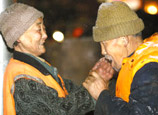
ALGIERS, Jan. 20 (Xinhua) -- The horrible hostage crisis at a remote Algerian gas field facility, which drew international attention over the past week, seems to have reached a breakoff after the Interior Ministry announced Saturday the death toll from both the attackers and the hostages. However, a deeper look leaves several questions unanswered.
The assaulting group, which was "heavily armed" according to the Interior Ministry, intruded into Algeria from the eastern border. Niger or Libya could be their origin, but how could they managed to penetrate into a gas field and orchestrated massive abductions?
"It's hard to tell how the armed group infiltrated in a supposed secured zone," Salim Kelala, a professor at the Faculty of Political Science in the University of Algiers, told Xinhua, adding that only a private security firm was hired to secure the Tiguentourine gas field complex.
Though admitting that the Algerian authorities bear some responsibility in the terror attack given their failure to stop the infiltration of the armed men, Kelala said "The gas facility is located in a wide desert remote area, and the militants are equipped with high-tech communication devices and heavy arms ..."
Also, during the four-day hostage crisis, not many details, including the number of hostages and their nationality and the final death toll caused by a rescue operation launched by the Algerian Special Forces.
"In Algeria, security operations remain secret and details about them are usually provided after a period of time, while sometimes no detail is provided at all," Kelala said.
"So, the lack of official figures on the rescue operation has been expected. Yet, I think that the Algerian National Army did not want to provide any detail about this operation for tactical reasons, given that it was still ongoing," he said.
Western nations, or at least those who had nationals abducted in the gas field attack, criticized the rush of the Special Forces to raid the facility.
"The Special Forces raided so fast ... because the Algerian authorities wanted to deal with the hostage crisis without a foreign intervention, to avoid giving the issue an international dimension," Kelala said.
"I think the raid was the right option, given that the Algerian authorities managed to keep foreign nations watching rather than participating in the operation, and at the same time the army forces did not give a chance to the assaulting armed group to fulfill the objectives of its plan," he said, adding that they " raided the gas facility in order to prevent the militants from running away with the hostages."
As for the armed group that was behind the terror attack, the expert said "Actually, nobody can ascertain to whom this armed group really belongs. So the right thing to say is that it is an armed group carrying out terrorist acts to hit media boom to say to the world that it can do quality terror attacks in the most secured sites."
"It also wanted to make financial profits, through swapping the hostages and get ransoms to purchase more arms," he said.
Some reports said the armed group is linked to al-Qaida, and it carried out the attack as retaliation against Algeria which opened its airspace for French jet fighters to raid extremist armed groups in northern Mali.
"In my opinion, this terror attack has a clear connection with the French military intervention in Mali, regardless who is behind the attack, either Mokhtar Belmokhtar or someone else," he said.


















![]()
